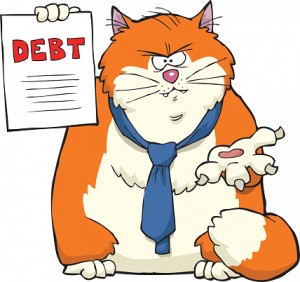 The main goal of most bankruptcies is the discharge—the legal write-off of debts. If you are considering filing bankruptcy to get a fresh financial start through a discharge of your debts, you probably don’t want to hear a bill collector telling you that you won’t be able to discharge that debt.
The main goal of most bankruptcies is the discharge—the legal write-off of debts. If you are considering filing bankruptcy to get a fresh financial start through a discharge of your debts, you probably don’t want to hear a bill collector telling you that you won’t be able to discharge that debt.
So what is the truth about prior threats to challenge the bankruptcy write-off of a debt?
Idle Threats
Most of the time if a creditor or collector on an ordinary debt tells you that debt won’t be discharged, they are wrong. They are likely lying to you to or trying to confuse you in an effort to prevent you from filing bankruptcy.
It’s true that any creditor can challenge the discharge of its debt for certain legal reasons. But creditors almost never have the necessary legal grounds to make such challenges. So they very seldom follow through on their threats.
Debts that Aren’t Discharged
Most debts that you want to discharge in bankruptcy DO in fact get discharged. There are three categories of debts that don’t or may not:
- Those that you choose not to discharge. That’s usually because these debts are secured by something you want to keep, such as your vehicle or home. So you are willing to continue to owe the debt in exchange for your right to keep the collateral.
- Those that the law does not allow you to discharge for specific public policy reasons. These include child and spousal support, newer income taxes, most student loans, and such.
- Those that were incurred through fraud, embezzlement or other similar bad behavior on the part of the debtor.
Putting the first category aside, most of the time a threat from a creditor or collector is not based on the second category. Your debt is probably not one of the few types that can never be discharged. If you are being told that the creditor will challenge the discharge, and the debt is not a tax, student loan, and does not arise out of a divorce, most likely the creditor or collector is wrong.
But there are some other relatively rare types of debts that can’t be discharged. So simply ask the person to tell you why the debt wouldn’t be discharged. Then talk to an experienced bankruptcy attorney to find out whether that reason is legitimate and thus whether the debt would really be discharged.
Fraud and Other Bad-Behavior Debts
The third category above is the one that is usually at issue when a creditor threatens to challenge the discharge of the debt. The debt collector is telling you to not bother filing bankruptcy because his or her company will act to prevent the discharge of its debt.
As stated above, such threats are usually not valid because the legal grounds for such challenges are almost never present. The required grounds are quite narrow, usually requiring you to have intentionally cheated the creditor in some way AT THE TIME the debt was incurred.
Proving Fraud
For a creditor to show that a debt was fraudulently incurred, it would have to show that you received or used credit as a result of giving some specific false information to the creditor, which you knew was false, which you provided purposely to cheat the creditor into letting you get or use the credit, which false information the creditor actually relied on to give you credit, AND the creditor was directly harmed in doing so. Again, the facts almost never support a creditor being able to establish all of these in order to prove fraud. If not, the debt is generally discharged.
But be careful because sometimes the creditor’s task is made easier if the false information that you allegedly gave was implied. For example, when you write a check, doing so implies that you have money in the account to cover the check. So, often a bounced check, or a similar use of credit without the intent to pay it back, can be challenged as “fraud” for bankruptcy purposes. Be sure to tell your attorney about any bounced checks or any situations in which a creditor said it would challenge your debt in bankruptcy.
Conclusion
If you live or work in the Dallas-Fort Worth Metroplex I can help you determine whether a creditor’s threats hold any water.
I am Carrie Weir, a Texas bankruptcy attorney. I serve mostly around the area of Rockwall, Heath, Greenville, Lavon, Wylie, Mesquite, Royse City, Sachse, and Rowlett. Please get in touch with me for a free and confidential consultation. Call 972-772-3083 or use the contact form here.
Thank you. It would be an honor to serve you.








Speak Your Mind